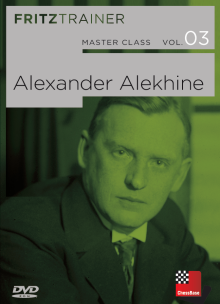 Training/Master Class/
Training/Master Class/
Master Class Vol.3: Alexander Alekhine
by Dorian Rogozenco, Dr. Karsten
Müller, Mihail Marin, Oliver Reeh
2014
http://www.chessbase.com
E-Mail info@chessbase.com
Price Euro 29.90
ISBN: 978-3-86681-425-7
Pentium-Processor at 300 Mhz or higher, 64 MB RAM, Windows XP, Windows
Vista, Windows 7, DVD drive, mouse, soundcard
Alexander Alexandrovich Alekhine,{Born 30 October 1892
and died March 24,1946) was the fourth World Chess Champion, and is
considered by
many as one of the greatest chess players of all time.
With the age of 22 he belonged among the strongest chess players
in the world and in 1927,
he became the fourth World Chess Champion by defeating José
Raúl Capablanca.
ChessBase come with a super made product on Alekhine with not only a
collection of all his known games,and that are a impressive 2327 games!
The former Alekhine game file from ChessBase only had 2234 entries.
But this DVD also holds a impressive five hours video entertainment,
Interactive tactics test with video feedback, Alekhine powerbook: the
repertoire of the World Champion as opening tree, Tactic training: 102
Alekhine games with training questions plus photo’s,tournamant tables
and a short biography.
The user of this DVD also shall find a lot of historical research on
Alekhine for see his last correspondence game:
Myers: During his visit to Iceland in 1931, Alekhine started up
two games with members of the Reykjavik Chess Club, evidently while
having
lunch in the restaurant of the Hotel Borg. Despite the
unusual circumstances under which they were played, Alekhine
characteristically took the
games seriously. (This game was published in various periodicals,
including "Chess Review", October 1933, with annotations by
Alekhine.) Because
all but the first few moves were played by telegraph or radio
transmission, the games are properly considered correspondence games,
probably the
last played by Alekhine, according to Harding. So we have
an interesting composite game: First, a few moves are played
informally in a restaurant in
Reykjavik, without sight of the board. Then Alekhine made a
journey by ship to Denmark, and while the ship was at sea, moves were
transmitted
by ship's radio. When the ship docked at Copenhagen, the
Icelanders lost contact with Alekhine, as he travelled by rail across
Europe to Bled in
Yugoslavia. But from Bled Alekhine wired his address and another
move, resuming the game. And over the next few weeks the game was
finally
completed, with moves transmitted by telegraph! The main players
representing the chess club, according to Harding, were
Eggert Gilfer, Brynjólfur Stefánsson, and Hannes
Thórður Hafstein. The other game, with Alekhine
playing White, was drawn but has not
been handed down to us. By the way, we can fix the date of the
games with some accuracy. The Olympiad in Prague finished on 26
July, and
Alekhine travelled to Iceland. In August, Alekhine started up the
games in Reykjavik and departed for Bled, arriving before
22.08.1931.
The games then were then completed by 29.09.1931, when the tournament
in Bled ended.
City Reykjavik - Alekhine,Alexander [A47]
Corr radio/telegraph corr, 08.1931
1.d4 Nf6 2.Nf3 b6 3.g3 Bb7 4.Bg2 c5 5.e3 e6 6.0-0 Be7 7.Nc3 0-0 8.Re1
d5 9.Ne5 Nc6 10.Nxc6 Bxc6 11.a4 Qc8 12.a5 Rd8
13.axb6 axb6 14.Rxa8 Qxa8 15.Qe2 Qb7 16.Bd2 b5 17.Ra1 b4 18.Nd1 Ra8
19.Rxa8+ Qxa8 20.b3 c4 21.e4 c3 22.exd5 Nxd5
23.Be3 Nf4 24.Bxf4 Bxg2 25.Qb5 Bb7 26.Ne3 h6 27.Bc7 Kh7 28.Qa5 Qe8
29.Qb6 Bf3 30.h3 Qd7 31.g4 f6 32.Kh2 e5 33.dxe5 Qd2
34.Nf5 Qd1 35.Ng3 Qxc2 36.exf6 Bxf6 37.Nh5 Bh4 38.Bg3 Qd1 39.Bxh4 Qh1+
40.Kg3 Bc6 41.Bd8 Qf3+ 42.Kh4 c2 43.Qa7 Qf8
44.Be7 Qf7 45.Nf6+ gxf6 46.Qc5 Qg6 47.Kg3 Qd3+ 48.Kh4 Bg2 49.f3 Qxf3
50.Qxc2+ Kg7 51.Bf8+ Kxf8 52.Qc5+ Kf7 0-1,Tim Harding
wrote: The first 12 moves were played by radio while Alekhine was
aboard a ship sailing from Iceland; the game was concluded by post.
This was probably Alekhine's last genuine CC game. A drawn game with
reversed colours appears to have been played but not preserved.
Conclusion: One of those must have
DVD’s!
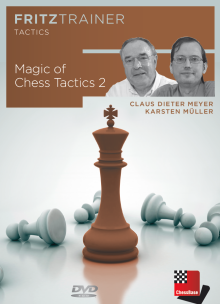 Training/Middlegame/Fritztrainer/
Training/Middlegame/Fritztrainer/
Magic of Chess Tactics 2
by Dr. Karsten Müller,
Claus Dieter Meyer
2014
http://www.chessbase.com
E-Mail info@chessbase.com
Price Euro 27.90
Pentium-Processor at 300 Mhz or higher, 64 MB RAM, Windows XP, Windows
Vista, Windows 7, DVD drive, mouse, soundcard
Claus Dieter Meyer and the great Hamburg grandmaster Dr.
Karsten Müller provides the user of this well filled
DVD,with higly instructive and well explained games
and fragments from games.
This all is well packed in 10 interactive games with video feedback,
112 games with training excercises and a hugh database with pictures
plus
238 intertaining games with exercises.
A fine game example is: Anand,Viswanathan (2788) - Kempinski,Robert
(2616) [B85]
Bundesliga 0910 Germany (11.1), 28.02.2010
1.e4 c5 2.Nf3 d6 3.d4 cxd4 4.Nxd4 Nf6 5.Nc3 a6 6.Be2 e6 7.0-0 Be7 8.a4
Nc6 9.Be3 0-0 10.f4 Qc7 11.Kh1 Re8 12.Bf3 Nd7 13.Qe1 Bf8 14.Qf2 Rb8
15.Rad1 Nxd4 16.Bxd4 b6 17.e5 dxe5 18.fxe5 Bc5 19.Bh5 Rf8 20.Bxf7+ Kh8
21.Ne4 Nxe5 22.Nxc5 bxc5 23.Bxe5 Qxe5 24.Bg6 Rg8 25.Bxh7 Kxh7 26.Qh4+
Kg6 27.Rd3 Qh5 28.Rg3+ 1-0
This all is instructively packed in two languages English and German
which is good for 2x 6 hours higly entertainment video time.
Conclusion: Higly instructive trainings material which will help you to
undestand the secrets of play.
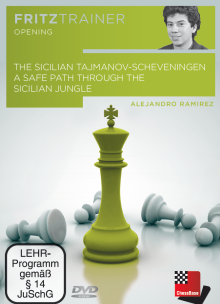
Training/Opening/Friztrainer/
The Sicilian Tajmanov-Scheveningen
by Alejandro Ramirez
2014
http://www.chessbase.com
E-Mail info@chessbase.com
Price Euro 29.90
Pentium-Processor at 300 Mhz or higher, 64 MB RAM, Windows XP, Windows
Vista, Windows 7, DVD drive, mouse, soundcard
The original Taimanov runs with moves as the following model game that
I found on this heavy loaded DVD: Morozevich,A (2739) - Vitiugov,N
(2719) [B44]
FIDE World Cup 2013 Tromso NOR (3.4), 19.08.2013
1.e4 c5 2.Nf3 e6 3.d4 cxd4 4.Nxd4 Nc6 5.Nb5 d6 6.Bf4 e5 7.Be3 Nf6 8.Bg5
Be6 9.Bxf6 gxf6 10.Nd2 a6 11.Nc3 f5 12.exf5 Bxf5
13.Nd5 Bg7 14.Nc4 0-0 15.c3 Be6 16.a4 Rb8 17.g3 Kh8 18.Bg2 f5 19.0-0 e4
20.f3 exf3 21.Bxf3 Ne5 22.Nce3 Nxf3+
23.Rxf3 Qg5 24.Qd3 Bd7 25.Raf1 Be5 26.Nxf5 Bxa4 27.Nd4 Qh6 28.Ne3 Bd7
29.Qe4 Rxf3 30.Rxf3 Qg6 31.Nef5 b5
32.Kg2 Bc8 33.Nc6 Bb7 34.Qd5 Qe8 35.Nfe7 Rc8 36.Nxc8 Qxc8 37.Ne7 Bxd5
38.Nxc8 a5 39.Nb6 Bxf3+ 40.Kxf3 Kg8
41.Ke4 Kf7 42.Nd5 Bg7 43.Kd3 Kg6 44.b4 axb4 45.cxb4 Kf5 46.Nc7 Kg4
47.Nxb5 d5 48.Nd4 Kh3 49.Nf3 Kg2 50.Ke3 Bf8
51.b5 Bc5+ 52.Kf4 Bd6+ 53.Ke3 Bc5+ 54.Ke2 h5 55.Nh4+ Kxh2 56.Nf5 Kg2
57.Ng7 Kxg3 58.Nxh5+ Kg4 59.Nf6+ Kf5
60.Nxd5 Ke5 ½-½.
The Taimanov Variation of the Sicilian is one of the most flexible ones
that black can go for and this set-up has been played as black
by every world champion from Tal onwards.
Pleasant to mention is that Alejandro Ramirez has provied the black
player with a wealth of alternatives as the for example games
with the English attack:
Quesada Perez,Yu (2595) - Robson,R (2615) [B48]
9th Panamerican Team Campinas BRA (1.3), 24.01.2013
1.e4 c5 2.Nf3 e6 3.d4 cxd4 4.Nxd4 Nc6 5.Nc3 Qc7 6.Be3 a6 7.Qd2 Nf6
8.0-0-0 Bb4 9.f3 Ne5 10.Nb3 b5 11.Qf2 0-0
12.Bb6 Qb8 13.Bc5 Bxc5 14.Qxc5 Bb7 15.Qd6 Rc8 16.Be2 Ne8 17.Qxb8 Raxb8
18.a3 Kf8 19.Rd4 Ke7 20.Rhd1 d6
21.Na5 Nc6 22.Nxc6+ Bxc6 23.Kb1 Rd8 24.Na2 Nc7 25.Nb4 Bb7 26.R4d3 e5
27.Bf1 Ne6 28.R3d2 Nc5 29.b3 g6
30.Nd3 Bc6 31.Nxc5 dxc5 32.Rxd8 Rxd8 33.Rxd8 Kxd8 34.Kc1 Kc7 35.c3 Kd6
36.Kd2 Bd7 37.Ke3 Be6 38.b4 cxb4 ½-½.
But also the famous Scheveningen gets a important turn:
Khachiyan,M (2522) - Ramirez Alvarez,Alejandro (2562) [B85]
111th US Open Irvine USA, 05.08.2010
1.e4 c5 2.Nf3 e6 3.Nc3 a6 4.d4 cxd4 5.Nxd4 Qc7 6.Be2 Nf6 7.0-0 d6 8.a4
Nc6 9.Nb3 b6 10.f4 Be7 11.Bf3 Bb7
12.Be3 0-0 13.Qe2 Nd7 14.Rad1 Rfe8 15.Kh1 Bf8 16.Bf2 Nb4 17.Bg3 e5
18.f5 Nf6 19.Bh4 Be7 20.Qd2 Rad8
21.Bxf6 Bxf6 22.Nb1 a5 23.c3 d5 24.Qe3 d4 25.Qf2 Na2 26.cxd4 exd4
27.Nxd4 Qc5 28.e5 Bxf3 29.Qxf3 Bxe5
30.Nb5 Rxd1 31.Rxd1 Bxb2 32.Nd2 Nc3 33.Nxc3 Qxc3 34.Qxc3 Bxc3 35.Nc4
Bd4 36.g3 Bc5 37.Rd7 h5 38.Nd6 Re1+
39.Kg2 Re2+ 40.Kh1 Rd2 41.Rd8+ Kh7 42.Nxf7 Rxd8 43.Nxd8 b5 44.axb5 a4
45.Nc6 a3 46.Na5 a2 47.Nb3 Kh6
48.h4 g6 49.fxg6 Kxg6 50.Kg2 Kf5 51.Kf3 Ke5 52.Ke2 Kd5 53.Kd3 Bd4
54.Kc2 Be5 55.b6 Kc6 56.Na1 Bxa1
57.Kb3 Kxb6 58.Kxa2 Be5 59.Kb3 Kc5 60.Kc2 Kd4 61.Kd2 Ke4 62.Ke2 Bd4 0-1.
This all and more is well explained with 4 hous and 39 minutes video
time.
Included is a extra database of 50 entries.
Conclusion: Highly instructive learning DVD with a lot of latest 2013
develpments!
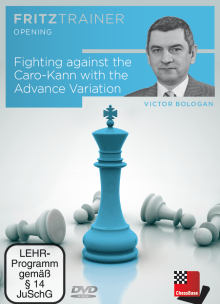
Training/Opening/Friztrainer/
Fighting against the Caro-Kann with
the Advance Variation
by
Viktor Bologan
2014
http://www.chessbase.com
E-Mail info@chessbase.com
Price Euro 29.90
Pentium-Processor at 300 Mhz or higher, 64 MB RAM, Windows XP, Windows
Vista, Windows 7, DVD drive, mouse, soundcard
Grandmaster Victo Bologan provides the user of this DVD with a well
thought made repertoire line based on The Caro-Kann Advance with
the line 1.e4 c6 2.d4 d5
3.e5 Bf5 4.Nf3 e6 5.Be2 which is after experts, the Tabiya of the
system.
Black has now the choice between various lines and these are all well
explained in video analyses and model games.
Bologan comes with a lot of original thinking and cover lines that are
not mentioned in the opening books as for example material based on the
move 5….c5!? which gets nearly no attention from for example, Karpov in
his book Caro-Kann Defence Advance Variation and Gambit System.
But first a example: 5.Be2-c5-6.0-0- 7.c3-8.Nd4 - for-white [B12]
1.e4 c6 2.d4 d5 3.e5 Bf5 4.Nf3 e6 5.Be2 c5 6.0-0 Nc6 7.c3 cxd4 [7...Qb6
8.dxc5 !? Ïîñëå
ýòîãî
ðàçìåíà,
áåëûå
çíà÷èòåëüíî
îïåðåæàþò
ñîïåðíèêà
â ðàçâèòèè,
îòòåñíÿþò
êîíÿ
÷åðíûõ è
çàâîåâûâàþò
ïóíêò d4. (8.Qa4 c4 9.b3 ! (9.Nbd2 ?!
9...Qa5 10.Qd1 h6 11.Re1 b5 ñ
íåÿñíîé
èãðîé, Short-Seiravan, Tilburg 1990)
9...Qa5 10.Qxa5 Nxa5 11.Nfd2 ! 11...Rc8 12.bxc4 dxc4 13.Ba3 (13.Na3 Bd3
14.Bxd3 cxd3 15.Ne4± Short 15...f5 16.exf6 Nxf6 17.Nxf6+ gxf6)
13...b5 14.Bxf8 Kxf8 15.Bf3 Ne7 16.Ne4±) 8...Bxc5 9.b4 Be7
10.Qa4 Kf8 (10...Nh6 èç-çà 11.Be3 Qc7 12.b5
Qa5T 13.Qb3 Nb8 14.Nbd2 0-0 15.c4) 11.b5 Na5 12.Be3 Qc7
13.Nbd2±;
7...Bg6 8.a3 cxd4 (8...Nh6 9.b4 (9.Bxh6 gxh6 10.b4 c4 11.Nbd2 Bg7
12.Re1 a6 13.a4 0-0 14.g3 f6 15.b5 Na7 16.Nxc4 dxc4 17.Bxc4 Kh8)
9...cxd4 (9...cxb4 10.axb4) 10.cxd4 (10.Bxh6 dxc3) 10...Be7 (10...Nf5)
11.Bxh6 gxh6 12.Qd2²) 9.cxd4 Nge7 10.b4 Nf5 (10...Nc8 11.Nbd2 Nb6
12.Bb2 Be7 13.Ne1 f6 (13...0-0 14.Rc1 Rc8 15.Nd3 Nc4 16.Nxc4 dxc4
17.Rxc4 b5 18.Rxc6 Rxc6 19.Nc5 a6 20.Bf3 Rc7 21.Qe2 h6 22.Rd1©)
14.h4 fxe5 15.h5 Be4 16.dxe5 0-0 17.Qb3 Nc4 18.Nxc4 dxc4 19.Bxc4+-
Bologan V 2687 - Eljanov P 2704 , 14.4.2012 19th TCh-RUS 2012) 11.Bb2
(11.b5 Na5 12.Nbd2 Be7 13.Qa4 Bh5 14.h3 Nh4) 11...Be7 12.Nc3 (12.b5 Nb8
(12...Na5 13.Nbd2) 13.a4) 12...0-0 13.h3 Nh4 14.Nxh4 Bxh4 15.Na4 Bg5
16.f4 Bh4 17.Rf3 Be4 18.Rc3 Be7 19.Qd2 a6 20.Rac1 Na7 21.Rc7±;
7...Rc8 8.a3 ñ èäååé
ïðîâåñòè b2-b4.8...
8...h6 (8...c4 9.Nbd2 Nh6 10.b3 cxb3 11.Nxb3 (11.Qxb3 Rc7 12.Bb2 Be7
13.c4 0-0 14.Bc3 f6 15.cxd5 exd5 16.Rad1 Kh8 ñî
ñëîæíîé
èãðîé,Short-Hjartarson, Manila IZ 1990.)
11...Bg6 12.Bxh6 gxh6 13.a4²) 9.b4 c4 (9...cxd4 10.cxd4 Nge7
11.Nc3 a6 12.Bb2) 10.a4 Nge7 11.Na3 Ng6 12.Nc2 Nh4 13.Nxh4 (13.Ne3
Nxf3+ 14.Bxf3 Bd3 ñ
ðàâåíñòâîì,Nunn-Korchnoj,
blind Monaco 1994.) 13...Qxh4 14.Ne3 Bh7 15.f4 Be4 16.f5±;
7...Bg4 8.Nbd2 Ëó÷øèé
õîä. 8...cxd4 9.cxd4 (9.Nxd4 Bxe2 10.Qxe2 Nxd4
11.cxd4 Ne7 12.Nb3 Nc6 13.Be3 Be7 14.Qg4 ñ
ìèíèìàëüíûì
ïåðåâåñîì ó
áåëûõ, Castaneda-Lesiege, Nort Bay
1996.) 9...Nge7 10.a3 Nf5 (10...Qb6 11.b4 Nf5 12.Bb2 a6 13.h3 Bxf3
14.Nxf3 Be7 15.Qd2 0-0 16.g4 Nh4 17.Nxh4 Bxh4 18.f4 f5 19.gxf5 Rxf5
20.Bg4² Kryvoruchko,Y 2679 - Feuerstack,A 2421 , Norderstedt GER
11.11.2012 Bundesliga 2012-13) 11.b4 Be7 12.h3 Bxf3 13.Nxf3 0-0 14.Bb2
a6 15.Qd2 c
ïåðåâåñîì
áåëûõ, Short-Karpov, Ct m/2 Linares
1992;
7...Nge7 8.dxc5 Ng6 9.b4 Ngxe5 10.Nd4 Bg6 11.Bf4] 8.Nxd4 Nxd4 [8...Nge7
9.Nxf5 (9.Bg5 Nxd4 10.cxd4 Qb6 11.Nc3 Nc6) 9...Nxf5 10.Bd3 Be7
(10...Bc5 11.Nd2 Bb6 12.Nf3) 11.Qe2 Qc7 12.Re1 Rd8 (12...d4 13.Nd2 0-0
14.Nf3 dxc3 15.bxc3 g6 16.Rb1 Rac8 17.Bf4 Ng7 18.Nd4 Rfd8 19.Be4 Nxd4
20.cxd4 b6 21.Rbc1 Qd7 22.Red1 Rxc1 23.Bxc1² Ghysens, Dirk 2367 -
Jonckheere, Peter 2371 , ICCF 15.10.2010 66th Belgian Championship)
13.a3 d4 14.c4 a5 15.Nd2 Nh4 16.g3 Ng6 17.f4 0-0 18.Ne4 Rfe8
19.Bd2² Baklan V 2612 - Arngrimsson D 2361 , 8.3.2012 Reykjavik
Open] 9.cxd4 Ne7 10.Nc3 Nc6 [10...h6 11.g4 Bh7 12.f4 a6 13.Be3 Qd7
14.Na4 Nc8 15.Rc1 b5 16.Nc5 Bxc5 17.Rxc5²] 11.Be3 DVD 11...Be7
12.Rc1 Bg6 13.Na4 0-0 14.Nc5 Bxc5 15.Rxc5 a6 16.Qd2 Qb6 17.a3 Rac8
18.Rfc1² Savic Miod1 2520 - Pantovic D 2101 , 4.9.2011 TCh-SRB
Premier Men Line.
Video running time is: 4 h 38 min and there is a extra database from 50
entries where I found several latest games.
Conclusion: One of those top openings
DVD!
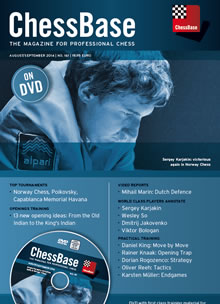
ChessBase Magazine issue 161
2014
August/September
http://www.chessbase.com
E-Mail
info@chessbase.com
ISSN 1432-8992
Price Euro 19.95
These ChessBase Magazines are well filled with latest games, video
files and more, for example the Tournament file with the tournament
games is good
for 454 entries where 21 of then are excellent analysed, as we
for example can see in the following game:
Sambuev,Bator (2562) - Dvirnyy,Danyyil (2560) [A80]
Capablanca Memorial Premier 49th Havana (8), 16.05.2014
[Meulders,R]
1.d4 e6 2.Nf3 f5 3.h3 A very rare move intended to avoid the main
lines, which can also be played on move 2. Of course the intention is
to continue
with g4, but 2.h3 is somewhat more solid than the immediate 2.g4, when
the most principled move for Black is to take the gambit. 3...Nf6 4.g4
Be7
[4...d5 looks best: Black blocks the centre, even at the price of
giving up the e5-square. 5.Rg1 c5 6.gxf5 exf5 7.Be3 c4 8.Bf4 Nc6 9.c3
Be6
10.Qc2 g6 11.Nbd2 Bd6 12.Be5? (12.Ne5=) 12...Bxe5 13.dxe5 Ne4 14.Nd4
Bd7 15.Nxe4? (15.N2f3³) 15...fxe4 16.Qd2 Nxe5 17.Qf4 Nf7
18.h4 Qe7 19.0-0-0?! (19.h5 is consistent) 19...Rf8 20.Nc2 Be6 21.Qe3?
(21.h5!) 21...Qxh4µ 22.f4 Nd8 0-1 (40) Bukal,V (2405)-Glek,I
(2590)
Porto San Giorgio 2002;
To my knowledge 4...fxg4 5.hxg4 Nxg4? has never been seen in serious
practice. For instance: 6.Qd3 Nf6 7.Bg5 Nc6 (7...g6? 8.Ne5 and Black's
position is already critical.) 8.a3 Qe7 9.Nc3 Qf7 10.0-0-0 d5
11.e4 Be7 12.Bxf6 Bxf6 13.exd5 exd5 14.Rxh7 Rxh7 15.Qxh7 Be6 16.Re1 Kf8
(16...0-0-0?? 17.Rxe6 Qxe6 18.Bh3+-) 17.Qh8+ Qg8 18.Qh2 Qf7 19.Nb5 Rc8
20.Bh3 Bxh3 21.Qxh3 Rd8 22.c3²] 5.gxf5 exf5 6.Rg1 0-0 7.Bh6
Ne8 8.e3 Kh8 9.Bf4 Nf6 10.Bd3 d6 [Again 10...d5 is more logical.]
11.Nc3 Nc6 12.a3 Be6 13.Ng5 Qd7 I don't like this move: if possible,
Black
should keep the bishop pair. [13...Bg8 14.Bxf5 Nd5 15.Nxh7 Rxf5
16.Qg4 Rf7 17.Ng5 Bxg5 18.Bxg5 Nf6 19.Qh4+ Bh7 20.Nd5 Qf8 21.Bxf6 gxf6
22.Nf4 Ne7 23.0-0-0 Qe8=] 14.Qf3 [14.Nxe6!? Qxe6 15.Qe2 Rac8 16.0-0-0
d5 17.Qf3²] 14...Bg8 15.0-0-0 d5 16.Qg2! Intending ¤xh7.
From now
the moves revolve around the weakness of g7, and the permanent
threat for Black of being mated there. 16...Bd6 17.Ne2 Nh5 18.Bxd6 Qxd6
[18...cxd6 allowing a doubled isolated pawn doesn't seem very
attractive, but at least it controls some central squares.] 19.Nxh7!
Made possible
by the mating threat created by 16.£g2. 19...Bxh7 20.Nf4 Nxd4!? A
resourceful way of meeting the mating threat, but White's advantage
remains.
21.Nxh5 Ne6 22.Nf4 Rf7 23.Nxd5± Black has defended well, but he
has dropped a pawn giving White a nice clear advantage. 23...c6 24.Nc3
Qe5 25.Bc4 Re7 26.Bxe6?! White might have hung on to the bishop. In an
endgame, if any, his remaining knight will normally be superior to
Black's
bad bishop, but we're not in the endgame yet. [26.Ne2+-] 26...Qxe6
27.Qg5 f4?! [27...Rae8 is a bit better, because the attempt to get some
counterplay
by giving up a second pawn should have led to defeat.] 28.Qxf4+-
Rf7 29.Qh4 Raf8 30.Rg2 b5 31.Rd8! Exchanges are of course in White's
favour.
31...a5 32.Qd4 [32.Rxf8+ Rxf8 33.Qg5 Qd7 34.Ne2 b4 35.axb4 axb4 36.b3
Rf6 37.Qe5+-] 32...Qe7 33.Rxf8+ Rxf8 34.Ne2?? A terrible move, which
throws away the advantage. White should have secured the position of
his queen by taking control of the black squares. [34.b4! Rf6 35.f4!
axb4 36.axb4 Rd6
37.Qc5+-] 34...c5! Suddenly the white queen has no good squares.
Because of the somewhat exposed position of the white king, Black has a
tactical counterstrike.
35.Qg4 Rxf2! 36.Rxf2 Qxe3+ 37.Kd1 Qxf2 Material equilibrium has been
restored and the unsafe position of the white king makes all future
winning attempts
impossible. As is often the case in positions where one has held
a considerable advantage, White soldiers on for a little more before
accepting the inevitable outcome of a draw.
38.Qc8+ Bg8 39.Qe8 Qf1+ 40.Kd2 Qxh3 41.Qxb5 Qh6+ 42.Ke1 Qh4+ 43.Kd2
Qh6+ 44.Kc3 Qf6+ 45.Kd3 Qg6+ 46.Ke3 Qg5+ 47.Kf2 Qh4+ 48.Ke3 Qg5+ 49.Kf2
Qh4+ 50.Ke3 ½-½.
Included is also a Tele chess file with all the latest correspondence
games of 10039nentries where a impressive 40 of them are excellent
analysed.
The theory files are always from high quality and this time the
following lines are covered:
Langrock: English Defence A40 1.d4 e6 2.c4 b6 3.e4 Bb7 4.Bd3,
Moskalenko: Budapest Gambit A52
1.d4 Nf6 2.c4 e5 3.dxe5 Ng4 4.Bf4 Nc6 5.Nf3 Bb4+ 6.Nbd2 Qe7, Karolyi:
Alekhine Defence B05
1.e4 Nf6 2.e5 Nd5 3.d4 d6 4.Nf3 Bg4 5.Be2 e6, Havasi: Caro-Kann B11
1.e4 c6 2.Nf3 d5 3.Nc3 Bg4 4.h3 Bxf3 5.Qxf3, Antic: Sicilian Defence B40
1.e4 c5 2.Nf3 e6 3.g3, Szabo: Sicilian Defence B48
1.e4 c5 2.Nf3 e6 3.d4 cxd4 4.Nxd4 Nc6 5.Nc3 Qc7 6.Be3 a6 7.Qd2 Nf6
8.f4, Stohl: French Defence C18
1.e4 e6 2.d4 d5 3.Nc3 Bb4 4.e5 c5 5.a3 Bxc3+ 6.bxc3 Ne7 7.Qg4 Qc7
8.Qxg7 Rg8 9.Qxh7 cxd4 10.Ne2 Nbc6 11.f4 dxc3 12.Qd3 d4, Krasenkow:
Queen's Gambit Accepted D28
1.d4 d5 2.c4 dxc4 3.Nf3 Nf6 4.e3 e6 5.Bxc4 c5 6.Qe2 a6 7.dxc5 Bxc5
8.0-0 Nc6 9.e4, Sumets: Queen's Indian Defence E15 1.d4 Nf6 2.c4 e6
3.Nf3 b6 4.g3 Bb4+ 5.Bd2 Bxd2+ 6.Qxd2 Ba6 7.b3, Marin: Nimzoindian E52
1.d4 Nf6 2.c4 e6 3.Nc3 Bb4 4.e3 0-0 5.Bd3 d5 6.Nf3 b6 7.0-0 Bb7 8.cxd5
exd5 9.Ne5 and at last Kuzmin: King's Indian Defence E83 1.d4 Nf6 2.c4
g6 3.Nc3 Bg7 4.e4 d6 5.f3 0-0 6.Be3 Nc6 7.Nge2 a6 8.Qd2 Na5.
Other contributions are: Daniel King:Move by Move,Rainer Knaak:Opening
Trap,Dorian Rogozenco: Strategy,Oliver Reeh:Tactics and Karsten
Müller:Endgames;Karsten Müller column holds two introduction
texts,20 annotated endgames,training questions and three video clips.
Included is a booklet in two languages.
Conclusion:Super material for a
bargain price!





